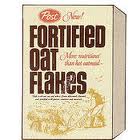When the law on additives took effect in 2004, in Denmark, Kellogg, the American cereal maker, applied for 18 products.
All 18 were refused because they were enriched with excessive levels of supplements as per Danish government standards.
Kellogg now sells a few products locally, which it manufactures so that vitamin and minerals are within the permitted levels. The Danish Food Industry would like to see the ban rescinded.
“It’s quite well documented that most vitamins are toxic, depending on the amount taken in,” said Jens Therkel Jensen, deputy head of the division for nutrition at the Danish Veterinary and Food Administration, a government agency.
All governments regulate food and drink sales. What is odd in Denmark is that the government, perhaps alone anywhere, is suspicious of fortified foods.
Manufacturers must apply for approval, which is granted if the vitamin or mineral enrichment is within levels set by the law.
For the last seven years, Marianne Orum has owned a narrow store in the heart of the Danish capital. A billboard on the store advertises ‘British and South African Food and Drink.’
But in January, Ms. Orum got a phone call from government food inspectors. Tipped off by a competitor, she told her that she was selling products that were fortified with vitamins or minerals, and such products require government approval, which she did not have, so she would have to take them off the shelves.
The culprits were Ovaltine, a chocolate drink mix; a wheat cereal called Shreddies; a malt drink called Horlicks; and Marmite, the curiously popular yeast byproduct that functions in England as a sandwich spread, snack or base for a soup (just add boiling water), and is sometimes known as tar in the jar.
In England, where Marmite has a cult following, the call for retaliation was immediate. When a British newspaper reported that Denmark had ordered Marmite off the shelves, almost 300 readers responded on the paper’s website, one demanding that Britain ban anything Danish like Carlsberg beer, works of Danish philosopher Soren Kierkegaard and demanded an embargo of Lego blocks.
“It’s a strange thing, this attitude in Denmark,” Ms. Orum said. “The government wants to decide what we eat and not.”
Application for approval, according to Ms. Orum, costs almost US$ 1700 dollars per product, and time for approval can run up to six months or more. The fee is not refunded if the product is rejected.

